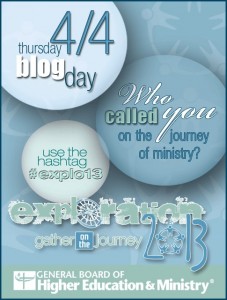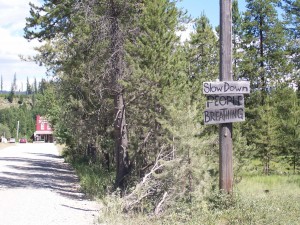
Friday’s “Break Free” post is now up at Ministry Matters. I hope you’ll click on over and check it out.


Friday’s “Break Free” post is now up at Ministry Matters. I hope you’ll click on over and check it out.
Here’s what I want for Mother’s Day: I want the church to break out of its bondage. I want us to stop our incremental “improvement” about how we speak and act in worship on Mother’s Day and claim a real holy-day instead.

Jessica Miller Kelley’s article at Ministry Matters earlier this week included some helpful and sensitive advice for making it through this Sunday’s worship without stepping on some of the biggest landmines. I appreciate her inclusion of the wide spectrum of mothering and her sincere effort to include mothers who may come to church on Sunday expecting the “traditional” celebration, while not excluding women who are dreading the day. But in her effort to include all sorts of women with all sorts of reproductive experiences, she effectively simplifies women’s experience. (And, though I’m sure it wasn’t her choice to use the photo, the accompanying picture of a mother and her baby didn’t help expand the topic.)
I finished her article thinking, It’s not all about (in)fertility. Mother’s Day is not only uncomfortable because some of us are unsettled or unhappy about our circumstances, whatever they may be. Mother’s Day is uncomfortable – especially in church – because it defines womanhood as motherhood. Yes, it can be difficult to be a woman who has not borne children or one who has miscarried or one who cannot have children. But it is not all about (in)fertility issues. It is not all about having or longing for children.
At the most basic level, this is still a painful day because our culture and our church are still having the same conversation we were having 50 years ago: Can women “have it all”? When and how does a woman decide to be a mother? How should she prioritize or find balance between work and family life? And we are still not asking these questions about men. Notice that we don’t fret when Father’s Day is coming up. Notice that we don’t make serious, expectation-filled mention of men when we talk about women having it all. The onus is still on women to make the accommodations, to make it all work – or to stop working or to settle for being a “sub-par” mother.
The focus of our conversation on children or lack thereof simplifies and pokes at something potentially painful, and reduces the conversation back to our biological role. The focus on Mother’s Day in church is then like a spotlight aimed right on each of us women, all eyes on us, waiting for a performance we are not interested in giving on this narrow stage of expectation. The lines are prescribed and rehearsed and there isn’t really room for new plotlines. These are complicated issues and merely trying to avoid offending people, or worse, trying to name and include every reproductive experience possible, are both inadequate.
So I want the church to break free and to stop worrying over how to “do” Mother’s Day right in worship. I want a new conversation and a renewed focus.
I want us to remember our baptismal calling, that we are a family formed by God’s call. I want us to remember what we vow when one of our young ones is baptized, that all of us together as the body of Christ have responsibility for raising children in the faith. Sure, mothers of all sorts would continue to be lifted up as disciples who take on a special measure of this calling. But so would teachers, Sunday school teachers, police officers, fathers, social workers, artists – all men and women. Wouldn’t that be an interesting, theologically sound, give-us-a-reason-to-be-in-church way to observe this day and make it holy?
Two weeks into the new job I knew I had made a mistake. Sitting at my desk, trying to make it through the afternoon, trying to figure out how I would come up with a new plan, and the phone rang. It was Alex Joyner, the campus minister for the Wesley Foundation at UVA. I was an alumna and a Board member there and it was the middle of the afternoon. This is all he said: “I know you just started a new job, but – ” I interrupted and said to him, “Whatever you are about to ask me, the answer is ‘yes.’” It was the craziest and wisest thing I’d ever done. 
I had finished seminary 5 years before this and, like Jonah, I had gone traveling in the other direction for a while, hoping what I heard wasn’t God calling my name. I ended up back in my college town, volunteering at the Wesley Foundation, wondering around the edges how I could finally figure out this vocation thing, but still not certain ordained ministry was my calling.
And then that phone call. Alex had money for a part-time associate and he wanted me to do it. I didn’t know that when he called or when I interrupted him. My response was completely unexpected and made no sense, except that my whole being was finally ready to say “yes” and something in his voice sounded like God saying my name again.
But I could start this story with Cindy Maupin (now McCalmont). She was the youth director at my church the summer between high school and college. She had just graduated from the school I was about to attend. After the summer she was headed off to serve as a US-2 missionary across the country and then on to seminary. I don’t know if she specifically encouraged me to consider seminary but her example was enough to open that door in my imagination. I had never had a female pastor but watching her I could envision what one might be like. I could envision how I might be one.
When I got to college, campus ministers Brooke Willson and Barry Penn Hollar made it explicit: “Why don’t you go to seminary?” They asked me this more than once. I wasn’t entirely sure what they saw in me that made them say this, but I was intrigued. When I started testing out the idea with friends at the campus ministry, no one laughed. Our United Methodist understanding of ordination is that both the individual and the faith community need to recognize a person’s call to ministry. Sometimes, with us stubborn Jonah-like folks, the community hears God more clearly than the individual.
That’s how it was for me for a long, long time. Even when I rashly answered “yes” to Alex on the phone and worked with him for an academic year, part of me held back, still questioning if this was it. Then, at the end of that year during our baccalaureate worship, Jessie Smith, a graduating student, got up to speak. Before her remarks she thanked Alex and me for our ministry and our roles in her journey. When she mentioned me she called me her “spiritual guide.” Simultaneously, I had two reactions: 1) I am not her spiritual guide! and 2) Oh crap, she’s right. Jessie was the straw that broke this strong Jonah-camel’s back. She was the last in a long line of people who could hear God calling my name long before I was willing to hear it and respond in full.
Thank God for each of them. The ones I’ve named here and the many others who encouraged or challenged me. As surely as God has spoken directly to me, God has also given them words I needed to hear. Maybe they were words I could only hear coming from those people at those times. One by one, they chiseled away at my resistance and helped me to claim what I was reluctant to claim on my own.
God doesn’t just call once and then give up on us and move on. Not every call sounds exactly the same. But I can tell you this for sure: God’s call is more persistent than we are stubborn.
____
Today’s post is part of a group blogging day for ordained clergy, devoted to answering the question “Who called you on your journey of ministry?”
The United Methodist Church is hosting an event designed especially for those considering or wondering about a call to ordained ministry: Exploration 2013, being held November 15-17 in Denver, Colorado. It’s a great opportunity to meet other young adults (ages 18-26) pondering similar questions and to explore what God is saying to you and how you might respond. You can also check it out on Facebook.
 At a recent clergy event the workshop leader asked us talk about what gets in the way in pastoral care situations. When you are trying to offer or articulate hope to someone, what gets in the way for you?
At a recent clergy event the workshop leader asked us talk about what gets in the way in pastoral care situations. When you are trying to offer or articulate hope to someone, what gets in the way for you?
I listened as someone in my group talked about the cliques in her congregation and how they were insular and closed and it was hard to break into those circles. I thought that was a weird answer. Not an uncommon experience, maybe, but a weird way to answer what gets in the way “for you.” As she continued to talk she merely described in greater detail how they were closed off and why that was hard and frustrating.
She was clearly frustrated but she also wasn’t saying anything personal. She wasn’t actually describing why or how this situation gets in the way of her expression of hope. I reminded her of the question after she’d been talking for 5 minutes or more. She looked momentarily stunned, taken off course of her (perhaps usual) rant about the congregation. What makes this hard for you? What are you afraid will happen if you try to break apart the cliques? Like a breath of fresh air in a room of tired words and circular scripts, she said, “Rejection.”
But when the next person spoke she also started in the safe and well-worn territory of how frustrating the congregation was in certain behaviors. In great detail she described their patterns and pointed out how foolish those were. She didn’t offer a glimpse of her internal struggle around this situation until I reminded her of the question.
This is one of the reasons I find many clergy gatherings annoying and a little heartbreaking. Instead of relaxing into the wisdom and support of colleagues, instead of reveling in having peers with whom to share the strange (and wonderful) experience of our callings, we so often retreat into posturing and pretense. Even here, we are reticent to be who we really are.
I’ve been reading Brené Brown’s work recently. “Exhaustion as a status symbol” is her description of one of the ways we rank our worth among others and a very unhealthy way of arranging our lives. If I am going fast enough and my to-do list is long enough and I am always busy enough then I can proudly say “crazy busy” anytime anyone asks. You know how that goes. When someone dares to schedule a vacation, others say, “Must be nice. Wish I had time to take vacation! I haven’t had one in 3 years.”
I have even encountered this – multiple times – in clergy gatherings. Pastors who never take a day off or turn the phone and email off. Pastors who look at you with pity, amusement, disdain, hostility, pride, or a combination of those when you talk about observing Sabbath or choosing to say “no” to a request or in any way refusing for one moment to pretend that you are Super Pastor. No wonder we are afraid to start where we really are, to say “rejection.”
I admit that I am not looking at most clergy gatherings as opportunities to share my deepest thoughts, dreams, and struggles. But I do keep hoping to get beneath the professional minister veneer and the competitive colleague game and at least savor the day and the time together as the gifts they are.
(Getting ready for Lent to start again in a few weeks… This post was originally written for the NCMA blog on 2/23/12.)
This week, on Ash Wednesday, we will have ashes “imposed” on our foreheads, marking us with a dusty, ashy cross as we set out on the journey towards Easter. We will try not to be self-conscious when we see ourselves in the mirror, or clean off the stray ashes as they fall on the bridge of our noses. We will go about our day, marked so that no one can miss it, while trying to pretend it’s business as usual.
 I’ve been thinking about Ash Wednesday a little differently this year as I’ve worked on the liturgy and prepared myself to say to people, one after the other, “Remember you are dust, and to dust you shall return.” I blame it on the pottery classes I’ve been taking.
I’ve been thinking about Ash Wednesday a little differently this year as I’ve worked on the liturgy and prepared myself to say to people, one after the other, “Remember you are dust, and to dust you shall return.” I blame it on the pottery classes I’ve been taking.
Each week, with my hands in the clay, I am reminded that I am made of the same stuff. Each week, when we ladle soup into bowls I’ve made, I am reminded that they used to be lumps of clay. Each week I form lumps into new shapes and I am also being formed – not just into a potter, but into someone who pays more attention.
On Wednesday as people come forward during worship, I will be holding a small blue bowl I made, which will, in turn, hold the ashes. Dust, holding clay, holding ashes.
The journey of Lent is simply a reminder of our bigger journey: pilgrims on the way, dusty from the road, and marked by the cross. The journey is to practice: paying attention, knowing who we are, seeing the big picture. Remember that you are dust. There is no other business than this. We are all lumpy clay, with the Potter’s fingerprints all over us, forming and transforming us until we transform once again into dust.